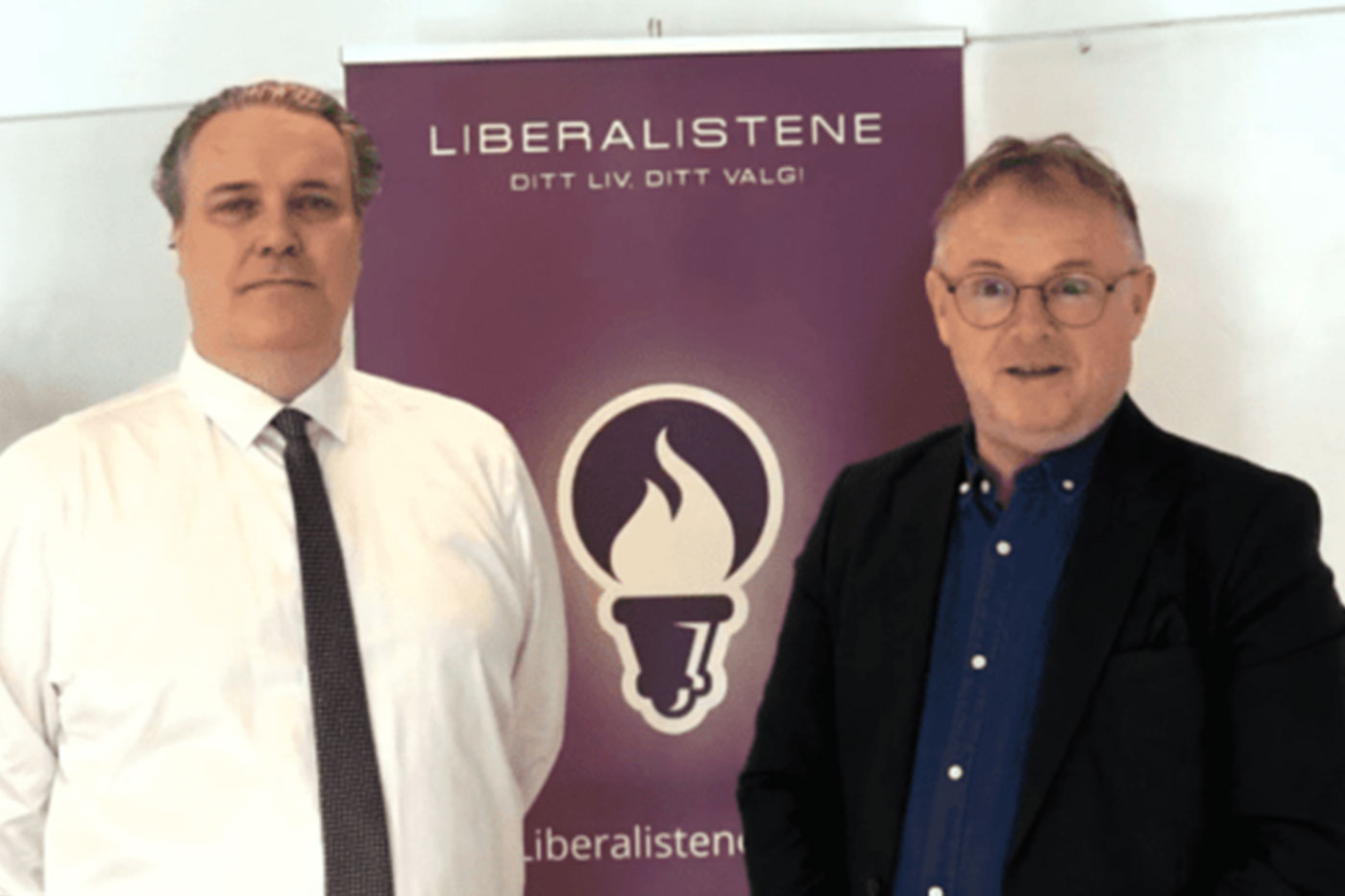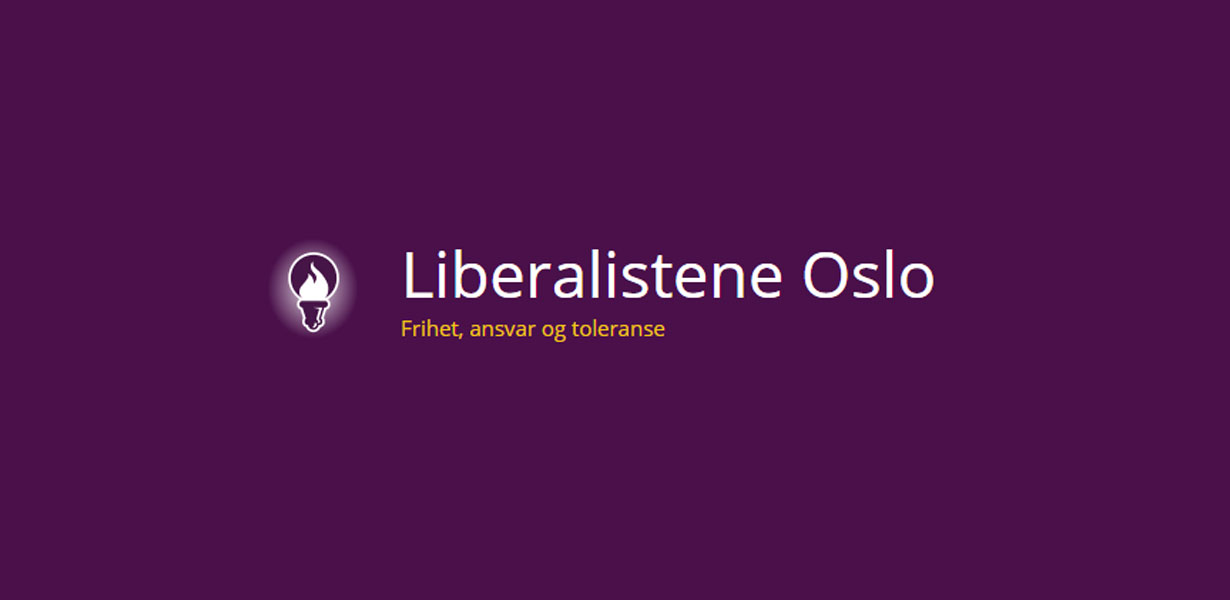Liberalistene Oslo (Capitalist Party, Oslo Chapter)
Norway, Oslo
Liberalistene is the only classical liberal and libertarian oriented political party in Norway. Individualism, Laissez-faire, Minarchism, Euroscepticism (love Europe, not a supranational union), decentralization of political power - preferably all the way to each and every individual human being.

Main Services:
Liberalistene Oslo, Capitalist Party Oslo Chapter, individualism, Laissez-faire, classical liberalism, minarchism, libertarian, decentralization, Euroscepticism, negative rights

Liberalistene is the only classical liberal and libertarian oriented political party in Norway. Individualism, Laissez-faire, Minarchism, Euroscepticism (love Europe, not a supranational union), decentralization of political power – preferably all the way to each and every individual human being.
Founded in 2014 and fully registered in 2016, the party has established chapters in all counties and a lot of municipalities throughout Norway. The ideological platform advocates for a minimal state, with governing principles based on Western constitutionalism, a republic and free market economic doctrine. The political platform and programs organizes steps in the right direction, in each field of political activities, and on all governmental levels.
The party is led by a central (national) board, which is chaired by Ronny Skjæveland since 2020, and political deputy chair, Roald Ribe. The Liberalistene Oslo chapter is chaired by Peter Hagen, with deputy chair Christian Weld Haakonseth.
In 2017 Liberalistene participated in its first national election, attempting to capture seats in parliament, with full coverage of all possible election districts in the country. It received 5 599 votes, equal to 0,2% of the total votes. During late 2017 and 2018 the Capitalist Party developed national guides for political programs with local county and district scopes, to be used as a foundation and a baseline by the local chapters, for their local political programs and activities. They were ratified by the fourth national congress. In 2019 the Capitalist Party participated in its second municipal elections, with full coverage of all possible counties (fylke) and 42 municipalities (kommune) in the country. The Liberalistene Oslo chapter additionally covered 7 out of 15 city districts.
Parliamentary elections are coming up in the fall of 2021, on September the 13. The list of candidates put forward in the election by Liberalistene Oslo is headed by Per Sandberg, who joined the party during 2020, with Roald Ribe in second place. The recruiting of Per Sandberg represents a leap forward for the young political party, based on the fact that he is one of the 10 most well known politicians in Norway, and has served as Minister of Fisheries from 2015 to 2018. Sandberg has been a member of the Norwegian parliament since 1997, and served as chair of the parliamentary standing committees on Justice, and Transport and Communications. He was deputy chair of his former party, before he left it and joined Liberalistene.
The main political focus of Liberalistene is:
1. A society that is safe for all. It should be safe to travel around without being attacked or robbed. It should be safe to create value without it being unfairly taken away from you. The respect for the integrity of the family and privacy must be strongly upheld. To achieve it, Liberalistene will re-establish the rule of law. That is, the state’s sole purpose is to protect citizens’ rights: property rights and the right to their own lives. The state must convict criminals and keep an eye out for military threats, but at the same time the state itself must be kept in check by rule of laws security mechanisms – as well as transparency tools that everyone can access.
2. Increased welfare and prosperity for all. Prosperity is one of the prerequisites for living a good life. Nothing comes to us for free from nature – everything you see around you and use in daily life is collected, produced and processed by humans. In order to maintain a good and safe framework around us, it is necessary to base it around what makes all this possible at the outset: free thinking and productive work.
Liberalistene promotes and supports a sustainable economy. This means that state and economy must be kept separate, just as state and religion should be. When creative and productive people are left alone to develop themselves, their own products and services, the result is positive for all, in all areas of life.
This, together with property rights and technological development, ensures a clean environment, a more humane and service-oriented health care system, better transport solutions and a steady reduction in the amount of poverty.
3. Greater diversity and more tolerance for it, is one of the many positive consequences of a liberal society. For classical liberals, diversity is not just about skin color or different cultural expressions, but about all types of people, about completely different ideologies and about any number of different offerings in pretty much anything and any field imaginable.
Since the individual is the smallest minority, it is what liberalism should focus on defending. The consequences are that different types of people, whether they are heterosexual, gay, fair-skinned, dark-skinned, have a collectivist ideology or an individualistic ideology, or have extremely different interests, can live side by side – as long as they respect the right of others to live in peace.
A state governed by the rule of law and secure property rights create the conditions and space for both large and small companies, a variety of educational offerings, a mix of high technology and natural oases, as well as space for all creative and productive people who may wish to come to the country.
The ideological pillars of classical liberalism is the individual, property rights, rule of law and tolerance for differences.
1. The individual is sovereign and inviolable. This means that no one has the right to prevent a peaceful individual from living his life as he wishes, as long as it does not unduly affect others. The individual is entitled to negative freedom, freedom from things (negative freedom or rights is a philosophical term). Freedom from abuse, from theft, from fraud, from threats, from violence and so on.
The individual is not entitled to positive freedoms, i.e. freedom to do anything. This could be, for example, freedom to receive free school or health services. If an individual is to have positive freedom, it cannot at the same time have negative freedom, as the two mutually exclude each other. A person cannot be protected from the use of force by others, and at the same time be forced to sponsor the costs of others.
In order for the free and creative individual to be able to live in peace and develop as best he can, he must be protected from abuse and the use of force by other people. This is ensured through a constitutional rule of law, where property rights are central and ideas about tolerance and the individual outlined here are considered valid.
2. Property right is the right to use one’s property in peace. Property can be a piece of land, a building, an object, income or an invention. In a full rule of law, property rights are inviolable, meaning that you fully own your life and property, and that no one else has the right to interfere with them as long as you are peaceful.
Property law works optimally in a state governed by the rule of law with a core and constitution that protects the individual’s right to live in peace. If you have a Constitution and legislation that allows for giving people rights beyond living in peace, this necessarily works against a peaceful existence.
A concrete example: If people have a statutory right to receive free education, others must pay for this with their property. This is not about volunteering, but coercion. In such a case property rights are severely limited, and are subject to the arbitrary claims from rulers, politicians, groups or a majority.
3. Tolerance for differences is a huge advantage in classical liberalism, over all other ideologies. Respecting other people, even if they have strange customs, a different skin color or a different sexual orientation, is the alpha and omega of classical liberalism. It also tolerates people with different ideologies and philosophical foundations, as long as they do not insist on allowing their actions to negatively affect other individuals.
Classical liberals tolerate socialists, but socialists will not do the same. The reason for this is simple: under a classical liberal rule of law, socialists can voluntarily live in socialist schemes, where private property rights do not exist and so on.
This is not possible in a socialist state, where everything is centrally controlled and all citizens must follow arbitrary rules and share their production whether they want to or not. In such a place there is no room for classical liberals who believe in property rights and that peaceful individuals must be allowed to live in peace.
Where does the tolerance stop? Liberalism cannot be tolerant of everything and everyone. As an example, one should not accept threats or the use of force against peaceful individuals. Nor can the classical liberal state sit still when groups or individuals want to destroy it in order to force their ideology onto everyone else.
Classical liberalism is thus not a naive ideology, but it is inclusive and tolerant of peaceful dissenters of all kinds. A liberal does not have to like something personally, but will still tolerate it as long as it does not affect him physically.
4. Rule of law is the foundation a classical liberal territory must use to protect peaceful individuals, private property rights and promote tolerance. This means that the rule of law sets the ground rules for human behavior within the state – what is determined by the law, and what is not.
Today, most states are governed by imperfect rule of law, which consists of conflicting principles. A state cannot both protect individuals against the use of force (a) and at the same time introduce a statutory right that one is entitled to “free” schooling (b) and health care (c). The latter “rights” (b and c) must necessarily infringe the former right (a).
If one accepts any violation of individual freedom by coercion from others, there is no longer any logical or solid framework within which a state governed by the rule of law can operate. In a representative majority government, the majority’s wishes change from year to year, and because of that constant possibility you can not expect any long-term stability with regards to what you can expect from it.
The classical liberal based rule of law has the opposite effect: it provides long-term stability. The reason for this is simple: At its core, the rule of law should focus exclusively on protecting peaceful individuals from unwanted disturbance of others. This is also known as negative freedom.
Liberalistene Oslo will keep on fighting for more attention around “negative” freedom and rights for individuals, Laissez-faire, fair rule of law, classical liberalism and minarchism. We salute all our colleagues out there, and wish you all the best with your efforts for the same, in your country.



